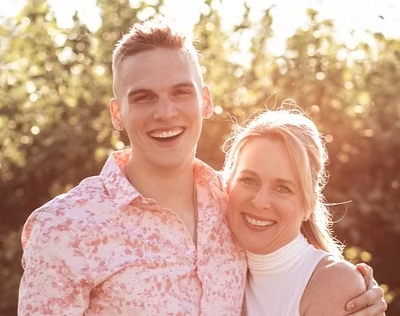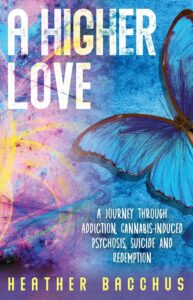
The Butterfly upon the Sky
The Butterfly upon the Sky,
That doesn’t know its Name
And hasn’t any tax to pay
And hasn’t any Home
Is just as high as you and I,
And higher, I believe,
So soar away and never sigh
And that’s the way to grieve—
—Emily Dickinson
Randy Michael was getting high on 4/20. For a high schooler who was at the time relatively new to marijuana, the holiday was nothing short of an opportunity to demonstrate his commitment to the drug. His best friend, Aaron, had reached out to him to play video games, but Randy declined the offer for the express purpose of getting high with other friends of his.
Aaron took his life the next day. It’s been said that when someone ends their life, their pain does not necessarily disappear but is passed on to those who cared for and loved them. Randy Michael basically proved this years later, when his mom found a diary entry recalling the wound of his best friend committing suicide, and the other of feeling like he could have been there to prevent it. “My best friend… took his life, and I smoked the pain away, but not for good,” Randy Michael mused.
In her book A Higher Love, in which Heather Bacchus details her son’s struggles and especially how marijuana fueled his descent into increasing derangement, she reassures the reader that Randy Michael is now much better off in his heavenly abode, having used his own hand to depart from hell on earth, just like his best friend Aaron back in the day. Again, many believe suicide merely transmits pain to others, and Randy Michael’s parents were dealt their share.
Having read the book, however, it was clear to me that Randy Michael’s parents decided that pain, even unimaginable pain, has the potential to still be transformed into something beautiful. Just like warty, globular caterpillars that transform into breathtaking butterflies. The relevant thing to note with that transformation is that it is not automatic. The caterpillar exerts a great amount of pressure into seeing it through, eventually flitting its beautiful wings. I understood that Randy Michael’s parents understood this, and that understanding had a lot to do with their values and ability to make meaning.
“We share our story,” says Mrs. Bacchus, so that we can describe signs that have given us hope and brought us healing after unimaginable loss.” The ancient, human art of helping one another through the pain. But at a deeper level, as Heather explains, “Ultimately, we share our story because we want to help others avoid the tragic turn that has been written into our family’s story… If we can prevent even one teen from experiencing the problems of drug use, we will have helped spare an entire family the chaos, uncertainty, pain, and loss that go hand in hand with addiction.” Later in the book, she refers to their desire to share all that they have learned “for the love of others” (emphasis included).
Mrs. Bacchus expressing the sentiment that their willingness to open themselves to others because they ultimately loved them was, I believe, based on love for their son. I make this claim because The Bacchuses forgave Randy about an infinite and one times. As Randy continued to fall further into the clutches of marijuana addiction, his behavior became increasingly sporadic, erratic, and sometimes downright inappropriate and disrespectful to his parents, the people who cared the most about him. I was honestly in awe of how much they were willing to take.
Then I remembered why. They were Christians who lived their faith in every aspect of their existence, the most important being their relationships with their children. And so, the love for their son was an authentically Christian love.
In full disclosure, I am a non-Christian, but faithful person myself. So where do I get off proclaiming this? From a December 1957 sermon by Reverend and Dr. Martin Luther King Jr. entitled The Christian Way of Life in Human Relations. In the sermon, he delineated three different types of love, each rising in strength: eros, romantic love; philia, the reciprocal affection between friends; and agape, the highest form of love. Agape, loosely translated as brotherly love in Greek, he explains, is “the love of God operating in the human heart.”
He later explains that agape is ultimately “a willingness to forgive, not seven times, but seventy times seven.” Diane Nash, a Civil Rights activist herself who did important work in Nashville, expands on King’s definition of agape which she calls “love of humankind” into agapic energy or “the energy produced by love of humankind or the power produced by love of humankind.”
There is a connection between why Nash felt the need to coin the new term in the first place and the Bacchuses’ journey. Love was not just profound care and concern for an individual or individuals, but a powerful social-historical force that can implement positive change, making the world more loving and rounder. She didn’t necessarily want to clarify something but rather connect two notions together.
The Bacchus’ made that connection through the trials and tribulations presented to them, most prominently their own son taking his life as a result of marijuana addiction. They combined their unconditional and supremely forgiving love for their son, and their indescribable pain caused by his suffering and eventual passing, into their nonprofit Be Extraordinary, Be You. Through their nonprofit they work to inform and educate parents, youth, and young adults on the harmful and damaging effects of Marijuana (THC) and especially its effect on the developing brain given Randy Michael’s story.
Dr. Martin Luther King Jr. and the Civil Rights movement in general are criminally unrecognized for the way they thoroughly transformed us, whether as Americans, faithful people, people of all colors, really everyone with the capacity to love. I sharply realized this when in her book, Mrs. Bacchus points out that directly after an intense but usual argument with Randy Michael, their priest’s sermon was specifically on family dynamics, and how families will strengthen and grow in their love for each other if they prioritize the relationships over disagreements and choosing the person over the situation. That is, he said, unconditional love. The Bacchus’ are models of forgiveness, and I think their last forgiveness to their son is that he left them too soon. But ultimately, there is the truth that they now have a higher purpose, yes, the responsibility to share the highest love with the world.
I mentioned that it is unfortunate that the Civil Rights Movement doesn’t get the credit it deserves in its immense influence on ourselves and our lives, even when race isn’t salient. What is equally unfortunate, however, is that ‘movements’ which are contrary to those values are gaining noticeable traction, especially among youth. One of which being the marijuana legalization, normalization, and commercialization movement.
One of Randy’s frequent ways to comfort his mom about his marijuana use was that it was “created by God.” The argument is an easy one, but now, Mrs. Bacchus knows that it is based on a complex of disinformation and a different type of love. She writes: “Today I believe that this misleading narrative is fostered by an industry driven by profit, even if it comes at the expense of public health, truth, and wellbeing. A truly different kind of love, a selfish love: the line of a healthy bottom line.”
And that’s the rub. The addiction-for-profit industry loves people, especially youth, insofar as they are addicted to their product, the more severe the merrier. The basis of this love of others is a selfish love, about maximizing one’s own assets exploiting others, which is in contrast to that of the Bacchuses, based heavily on the struggles and passing of their son, and now selflessly channeled to assist and educate others who are caught in the marijuana industry’s web. This is what is so insidious about framing the marijuana legalization movement as a social-justice movement. When you look at the underlying values, you can see that social welfare is the marijuana industry’s furthest concern, and meanwhile, the values of the principled activists of yesteryear rest in those willing to defend or uphold truly human values and relationships.
Dr. King mightily said, we need a “revolution of values” and one way we can start is recognizing that marijuana use and drug use in general are incredibly harmful to all youth, and every child deserves to live in a world in which that is thoroughly impressed on them, especially via prevention efforts. It is unfortunate that wasn’t Randy Michael’s world, but at least his parents are actively working to change that for others.
Someone once told me that the most privileged class in any society should be the children, and I believe agape is the foundation of such a society. It is an ideal, but extraordinary people within our deeply imperfect world constantly strive to realize it. The Bacchuses are undoubtedly in their ranks, and they and other families tragically affected by the marijuana industry inspire us at SAM to keep working diligently towards an agapic world too. Where the safety and wellbeing of children reign, and where Randy wouldn’t have to be called home so soon.
By Nethan Reddy, Policy and Communications Associate at Smart Approaches to Marijuana (SAM)

